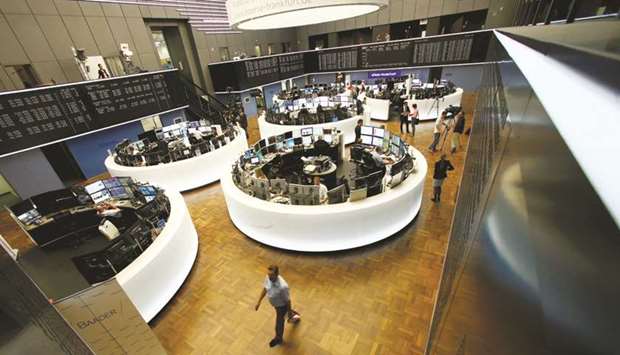European and US stock markets swooned into the red yesterday on downbeat US economic data and news of fresh US tariffs against Argentina and Brazil.
London’s FTSE 100 closed 0.8% down at 7,285.94 points, Frankfurt’s DAX 30 ended 2.1% lower at 12,964.68 points and Paris’ CAC 40 dropped 2.0% at 5,786.74 points, while the EURO STOXX 50 lost 2.1% at 3,626.66 points.
Asian markets had been cheered earlier in the day by a surprise jump in Chinese factory activity, but the party ended with a tweet by US President Donald Trump.
Trump tweeted that owing to unfair policies by Brazil and Argentina, he would reinstate tariffs on steel and aluminium from those countries.
“It doesn’t take a genius to guess how investors reacted,” said analyst Connor Campbell at Spreadex.
“Reversing their early gains, the eurozone indices all sank into the red, joined by an irritated Dow Jones,” he noted.
Trade-related concern was also stoked by China’s Global Times newspaper, which said Beijing wanted all US tariffs rolled back as part of a mini deal, a move observers said Washington is unlikely to agree to.
On Saturday, China said its manufacturing sector expanded in November for the first time in seven months, providing a boost to investors looking for signs of optimism in the world’s second biggest economy.
Another survey yesterday of smaller firms also showed a better-than-expected pick-up in factory activity.
On oil markets, crude prices came back from sharp losses last week after Iraq said top producers might announce an output cut soon.
On foreign exchange markets, the euro rose against the dollar after a survey revealed that the US manufacturing sector has contracted for a fourth straight month, which put more pressure on eurozone stocks because many companies would be hampered by the stronger single currency.
Some analysts had already raised concerns about an article in the Communist Party-linked Global Times, which tweeted that the government wants levies imposed on China to be removed as the US talks continue.
It also said leaders wanted tariffs lined up for December 15 to be taken off the table.
But OANDA senior market analyst Jeffrey Halley said: “It is hard to see the US swallowing a very bitter trade pill like that; it would, in effect, remove all of the US’s leverage in the far more difficult comprehensive trade negotiations to come.”
On oil markets, both main contracts rallied after Iraq said Sunday that Opec and other major producers would consider slashing output by 400,000 barrels a day to support prices when they meet in Vienna this week.
A World Trade Organisation ruling that the European Union continues to provide unfair subsidies to European plane maker Airbus, which supports the US case for retaliatory tariffs, also weighed on European equities.
“It’s a number of reasons coming in all at the same time,” Razaqzada said. “But with the stock markets at record high levels, this is always going to happen. Markets go up in stairs and then on the way down, it’s an elevator.”
Benchmark 10-year US Treasury notes fell 15/32 in price to yields up to 1.8258%.
Germany’s borrowing costs rose after the Social Democrats (SPD) chose new leaders critical of their own ruling coalition, with yields on benchmark 10-year debt set for the biggest one-day spike in nearly three months.
Benchmark German bond yields jumped across the board, with 10-year yields up more than 7 basis points to -0.273%, their highest in nearly three weeks.

Traders work at their desks in front of the German share price index, the DAX board, at the Frankfurt Stock Exchange. The DAX 30 ended 2.1% lower at 12,964.68 points yesterday.
